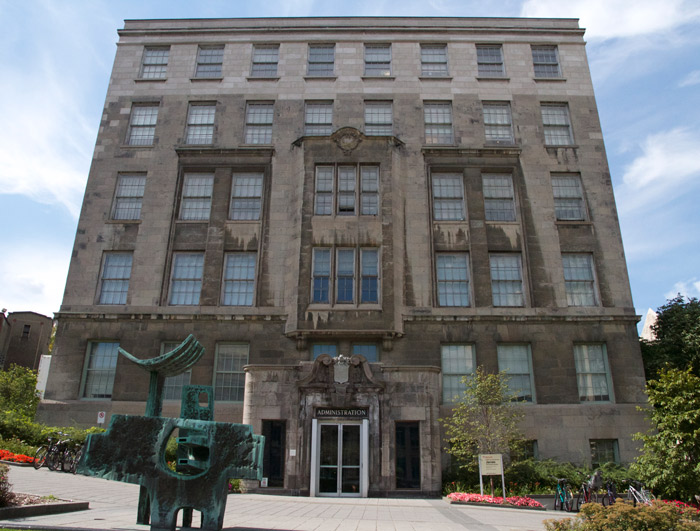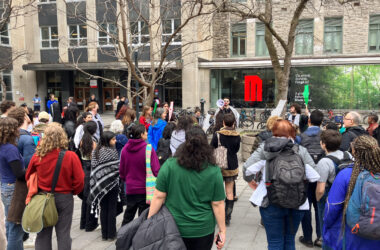At the Jan. 18 meeting of the McGill Senate, Provost and Vice-Principal (Academic) Christopher Manfredi presented a Report on the McGill Committee to Advise on Matters of Social Responsibility’s (CAMSR) September Open Forums on Sustainability and a written response to its recommendations. In addition, senators addressed questions submitted by Students’ Society of McGill University (SSMU) President Ben Ger and Vice-President (VP) University Affairs Erin Sobat regarding the Senate’s capacity to make recommendations on the governance practices of the Board of Governors (BoG).
Report and response to CAMSR Open Forums on Sustainability
A report on CAMSR’s Open Forums on Sustainability, as well as Manfredi’s written response, were presented to the Senate. In September 2016, CAMSR held three Open Forums on Sustainability to gather community input on the recommendations of the CAMSR Report on Divestment that was published in March 2016. The Report on Divestment was released in response to Divest McGill’s February 2015 petition, which called for the university’s divestment from major fossil fuel companies.
The forums were held to address Divest McGill’s dissatisfaction with CAMSR’s rejection of divestment and with the way the report was conducted. Specifically, the student group took issue with CAMSR’s lack of transparency in its consultation with experts and the insufficient community input on the report’s findings. In response to these concerns, Principal and Vice-Chancellor Suzanne Fortier committed to holding public forums in order to invite community dialogue on sustainability and the CAMSR recommendations.
The open forums sought community responses to two specific recommendations of the 2016 report: The creation of a plan to reduce McGill’s carbon footprint while pursuing ongoing sustainability research and education, and the development of concrete measures to ensure that all of McGill’s investments comply with recognized Environmental, Social, and Governance (ESG) principles.
“I was truly impressed with how the community came together,” associate professor of law Frédéric Bachand, who chaired the three open forums, said in his remarks to the Senate. “To offer advice and insight on how to improve McGill’s response to what is surely one of the greatest challenges of our time.”
Disappointment with the recommendations of CAMSR’s 2016 report and consequently weakened sense of trust in the administration’s commitment to sustainability were common themes of the open discussions, according to Bachand.
Given these findings, Manfredi’s response identified several measures for relevant university actors to pursue. These included setting a target date and plan for McGill to become a carbon-neutral institution and continuing to develop channels for community engagement with respect to sustainability.
“[It was] the trust and the breaking of trust that was a major concern to the McGill community,” Science Senator Sean Taylor said regarding forum participants’ frustration with CAMSR and the BoG’s handling of Divest McGill’s petition.
Sobat also underlined Manfredi’s failure to address the recommendations related to the loss of trust in the administration.
“Something I noticed [that was] not included [in the response] were recommendations or responses addressing section A of the report, around the breakdown in trust, specifically with administration and governance practices in the university,” Sobat said.
The report and response will be presented to the BoG on Feb. 2.
Question regarding university governance best practices
In December 2016, SSMU President Ben Ger proposed a comprehensive review of McGill’s governance structure and statutes. The aim of this review would be to compare McGill’s existing structures with those at other universities in order to determine the best practices to improve community engagement. Various members of the board opposed the proposal. BoG Chair Stuart Cobbett said that the review was not the best use of BoG resources and that the proposal lacked specificity.
“It is just you need to understand what it is you are looking for and questions need to be focused so the answers can be focused,” Cobbett said. “We are not running a broad ranging discussion, we need to have focused questions and we need to have focused answers.
On Jan. 18, Manfredi provided a written response, on behalf of the Senate, to two questions submitted prior to the meeting. The questions submitted were “What opportunities exist for Senators, and Senate as a whole, to provide recommendations regarding governance practices to the Board of Governors?” and “Given that the cyclical review process has recently been extended to include administrative units, would the University consider implementing this model for a review of governance bodies?” posed by Ger and Sobat. The questions were prompted in part by the SSMU November 2016 “A Seat at the Table: An Analysis of the McGill University Board of Governors” report that evaluates the current structure and administration of the BoG.
Manfredi said that when reviewing governance practices that implicate the academic mission of the university, the BoG has received and will continue to receive recommendations from the Senate. Manfredi’s response outlined the existing channels through which senators can provide recommendations, including the newly implemented bi-annual Board community sessions.
SSMU’s request for a cyclical review process for the BoG was rejected, as it would place the Office of the Provost and Vice-Principal (Academic)—the body currently responsible for the cyclical review of other administrative units—in charge of reviewing the unit to which it ultimately reports.
A previous version of this article incorrectly spelled Board of Governors Chair Stuart Cobbett's name. The Tribune regrets this error.









